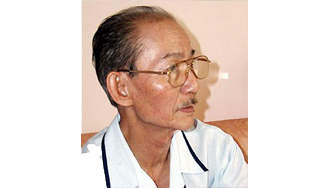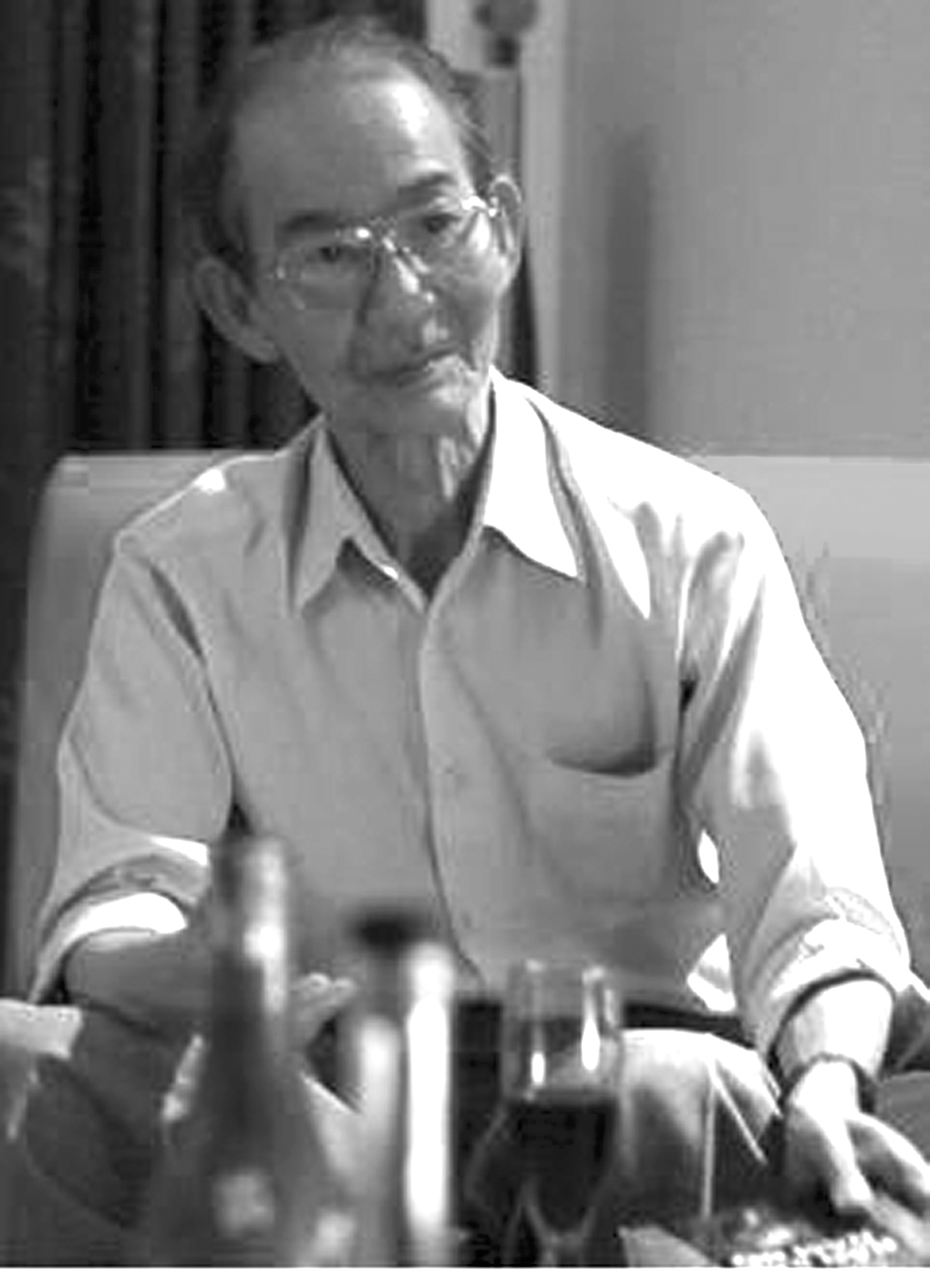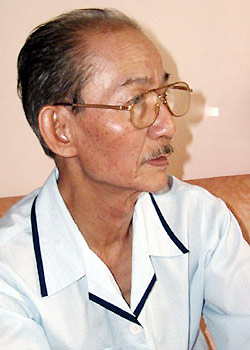
I entered Hanoi University in 1964, but before the Faculty of Literature was evacuated to Trang Duong - Dai Tu - Bac Thai in 1965, to be honest, I did not know who Cao Xuan Hao was. When I was in the evacuation area, with a lot of free time and people telling me all kinds of stories, I found out that in the Faculty of Literature there was a teacher named Ngoc (Phan Ngoc), a teacher named Hao Ngon Ngu, who was very good, but was not taught anything about "Nhan Van Nhan Veo", and was only responsible for translating foreign books into Vietnamese...

Associate Professor Cao Xuan Hao (1930-2007) - the greatest phonetician in Vietnam
The first time I knew Mr. Hao was like this. One day, it seemed to be a socialist labor Sunday, my class went to carry firewood or rice or something. I was walking on the village road with some seniors in the class, suddenly I heard them whispering, roughly speaking in today's language, that was Mr. Hao. Seeing a female student, he put down his shoulder pole and pretended to rest, he was embarrassed with us girls. I looked out and saw a man who clearly looked like a scholar waving his fan nearby, with a slender figure, a gentle face, in short, very handsome (at that time Mr. Hao was only 35 years old). I looked at him like that, but I didn't dare to get to know him, back then we looked up to teachers with great respect, one thing, two things, but kept our distance, only when we studied a certain subject did we know that teacher. Moreover, it was Mr. Hao, a naive person like me knew, let alone Nhân văn Giai phẩm, oh my, I was so scared.
The second time I saw Mr. Hao was at the Faculty of Literature's cultural festival. That night, the stage was set up close to the mountain, the kerosene lights were dim, and it was packed with people, both students from several classes and local people. The program included both singing, dancing, and musicals. Halfway through, I suddenly heard Mr. Hao's guitar solo introduced, and then I saw him walk up, sitting on a chair, holding the guitar, looking like a real artist, very graceful (he used to be a composer at the Fourth Military Region's Cultural Troupe). He played a classical piece of music specifically for the guitar. At that time, we were into the rush of things.My injustice is ma laor singOh, the flower of the pa family!, but the teacher's music was very slow but profound, the microphone was slow and quiet, the guitar played to a deaf ear, I looked around and didn't see anyone with a dreamy face or eyes closed, absorbed in the teacher's melodious music. I only saw people talking to themselves. After the song, teacher Hao went down, clapping his hands slowly.
The third time, around 1967, I was in my third year, had grown up a lot, and was still evacuated to Dai Tu. I don't remember which of my seniors told me that Mr. Hao had some really good translations of novels, and Thang liked to read them so he brought them to his house. It was the first time I sat close, face to face, talking to Mr. Hao, in a small room with thatched walls and earthen walls, but I didn't understand why he lived alone. I remember Mr. Hao said he still had a translation.Crime and PunishmentDostoevsky's book can be lent to you, but only for three days and you are not allowed to pass it on to anyone else (probably because he was afraid of losing it). Of course, I obeyed immediately, happily and secretly carrying a thick handwritten manuscript back to my room. Mr. Hao's handwriting was extremely beautiful, slightly tilted, even, the accents were clear and in the right place, not like mine: when writing the word "Thang", the sharp accent was removed all the way to the letter "g" at the end, the letter "a" had a flat belly just like the letter "e", just like my stomach, the one who wrote it, feeling hungry all day long, oh my, hungry all the time during the four or five years of student evacuation... I read all night, I still remember it was a moonlit night, leaning the book against the window, reading with a syringe oil lamp (a special lamp for students at that time, made from an ink bottle, using a syringe with cotton inserted into it as a wick, this lamp burned brightly and used little oil). The next day I pretended to be sick and stayed home to continue reading. I read so passionately that I didn’t even stop to eat that I stayed in the kitchen. I thought to myself, why is this Mr. Dot so talented? Mr. Tolstoy is not as talented as him, but Mr. Hao is also very talented, his translation is so good.
That afternoon I brought the books to return to Mr. Hao, he was very surprised because it had only been two days. He looked at me, asked me a few questions, and seemed to have obvious feelings. I took the opportunity to ask him if he had any translated books on language or any of his writings that he could lend me. He said he had some documents, but let him prepare them first and come back in a few days to get them.

He is one of the researchers who made the face of Vietnamese linguistics.
A few days later, I visited the teacher's house, this time I stayed longer. I asked him about his experience in self-studying Russian (at that time I was studying French, but I wanted to learn Russian because I had studied it in high school). What I remember most is the part where the teacher pinned to the wall or hung up some punched cards with difficult Russian words or sentences written on them around his bed. Teacher Hao said that I had to do it like this, so that I could memorize them by heart, otherwise I would forget them right away. So when I got home, I immediately imitated him in learning French, it was very effective, and later I also applied it to learning English, which was very effective.
Mr. Hao gave me three documents including the translation of the famous book by Mr. Stephen Ullmann.Principles of semantics, a topic of the teacher on "non-linear phonology" and a lesson on words that mimic sounds in Vietnamese. I took it home to read and was so fascinated, many things were not similar to what the teacher taught, but I didn't know how to get my own copy. I came up with a plan: flirt with "Mr. Hoang" Lao (a Laotian student, real name is Udom Sitralôn, Vietnamese name is Le Hai Hoang) who also studied Language in the same class as me, and asked him to each copy half. Hoang Lao was a curious person who liked new things. He was also a foreign student so he had pen and paper ready (at that time, I had only 16 dong in scholarship money each month, and I had to pay 15 dong for food, so the general principle was "increase and ask for a decrease" (some people even added "develop and take the wrong thing"). Luckily, Hoang Lao happily accepted. The two of us sat next to each other, competing to copy (of course, using Hoang Lao's pen and paper), it took several sessions to finish because the three documents were several hundred pages thick, and I still have them to this day.
It was not until after I graduated that Mr. Hao knew about this. One time, he praised me at the Institute of Linguistics that Thang had hand-copied my entire translation book. He also told some Soviet language experts who knew me. That's what everyone told me. At that time, I was young, and being praised by a superman like Mr. Hao, I felt so happy for several days...
Let's talk about the "non-linear phonology" topic book that Mr. Hao lent us. This is the preliminary draft of the book that he later translated and printed in France. Hoang Lao and I read and copied it, we were both fascinated. The theory was so good, so new, Mr. Hao wrote wonderfully.
A few months later, we had to do our graduation thesis. Hoang Lao did it on Lao phonetics, and I did it on Tay phonetics in Trang Dinh district, Bac Kan. Without anyone telling me, Hoang Lao and I copied passages from Mr. Hao's book, "tuong" into the part.Theoretical basisI submitted my thesis to Professor Thuat (Professor Doan Thien Thuat), excited that this time he would definitely praise me profusely. Unexpectedly, he called me in, asked me to rewrite it, and gave me the thesis of Thu (Dinh Le Thu, a Southern girl famous for being smart and good at studying in class) also written about Tay language, to show me as an example. Although I was upset, of course I had to listen to Professor Thuat, when I read it I was surprised that Thu wrote so simply and easily, without any theory of "linear/non-linear phonology", but the thesis was still as good as usual. So I followed Thu's way to revise my thesis, and when I defended it I was praised a lot...
September 2011
|
Cao Xuan Hao is the first Vietnamese person to have contributed an important voice to the world's linguistic theory. This is the greatest dream of a scientist. In this article, I intentionally do not mention his position and the names of his works, and I call him "Cao Xuan Hao" as the eldest brother of the phonology industry. I firmly believe that his reputation will remain and will grow with time. Death is common to everyone, but life after death is very rare. Among those people will be Cao Xuan Hao (Associate Professor Phan Ngoc- Some thoughts on the greatest phonetician in Vietnam). |
|
Among the researchers who have shaped the face of Vietnamese linguistics since the establishment of Vietnamese universities, we must mention the name of Cao Xuan Hao. Since 1956, starting with lectures and articles on phonetics and phonology, and from the 1980s onwards, with works on Vietnamese semantics and grammar, Cao Xuan Hao has made both profound and comprehensive contributions to Vietnamese linguistics, and to a certain extent, to linguistics in general.Vietnamese - some phonetic, grammatical and semantic issuesis a collection of most of Cao Xuan Hao's main achievements in more than 40 years of research; in which, there are works that have never been published or have been revised a lot compared to the original. This is a book that brings honor to the publisher (Hoang Dung -Cao Xuan Hao - linguist). |
|
During their twenty years as translators at Hanoi University, Cao Xuan Hao and Phan Ngoc left behind tens of thousands of pages of translated linguistic theories in English, French and Russian. Among them are immortal translations that are hard to rival, such as:General Linguistics Textbookof Saussure,Methods of Structural Linguisticsby Harris,Principles of phonologyTrubeskoj's,... And in the literary world, needless to say, he is the best translator. I have two teachers in classical Chinese expression. Mr. Nguyen Tai Can writes very simply, tightly, precisely and a bit "folksy". Mr. Cao Xuan Hao writes in a more polished, sophisticated and elegant style, even a bit... pretentious in his scientific style. He told me: "I see that you tend to follow Mr. Can's style in your writing, that's fine, but remember, Mr. Can's writing looks simple on the surface but is very difficult to imitate, very erudite and elegant, especially very difficult to find fault with". I understand and learn from both of them in their way of expression but still can't finish. Two talented and talented people respect each other very much. When talking to us, Mr. Hao always considers himself only a "disciple" of Mr. Can, while Mr. Can says: "Disciple? In terms of general theory, Mr. Hao is much better than me! If you study, you have to study from him!" Indeed, at times like that, we feel a bit… ashamed because we are still ignorant and sometimes "arrogant" (Prof. Dr. People's Teacher Dinh Van Duc- Remembering Cao Xuan Hao). |
|
ASSOCIATE PROFESSOR CAO XUAN HAO
+ Working unit: Department of Linguistics, Faculty of Literature, Hanoi National University.
Phonologie et Linéarité réflexions critiques sur les postulat de la phonologie contemporaine(SELAF, Paris, 1985) (work written in French and published in France); later translated into Vietnamese:Linear phonology, thinking about the postulates of contemporary phonology(Hanoi National University Publishing House, 2001). Vietnamese. Outline of functional grammar(1991). Vietnamese - some phonetic, grammatical and semantic issues, Education Publishing House, 1998.
+ 1985 Translation Award of the Vietnam Writers Association. |
Author:Associate Professor, Dr. Ly Toan Thang
Newer news
Older news